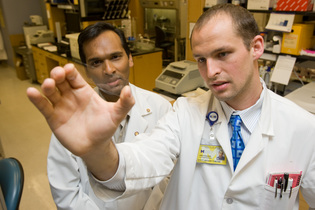University of Michigan study shows hope in treatment of aggressive form of prostate cancer

University of Michigan pathology resident and co-author of the study Scott Tomlins, right, and Arul Chinnaiyan, the senior study author, found they could boost success rates in shrinking an aggressive form of prostate cancer tumors by combining an antibody with normal treatment.
Courtesy University of Michigan photo services
Nearly 10 percent of the estimated 217,730 Americans diagnosed with prostate cancer this year will have an aggressive form more likely to spread or come back after treatment.
In trials with mice, researchers at the University of Michigan Comprehensive Cancer Center have used existing and experimental treatments to shrink deadly tumors in this group up to 74 percent, a study released Wednesday shows.
Previous work showed that a gene called SPINK1 occurs in the aggressive sub-group of prostate cancers, said study co-author Scott Tomlins, a pathology resident at University of Michigan.
In the new study, mice with the aggressive form of cancer were treated with an antibody for SPINK1.
“Your body makes antibodies in response to infections or foreign proteins,” Tomlins said. “It’s the basis for immunity. By injecting proteins (like SPINK1) into a mouse, the mouse will make an antibody for that protein.”
The antibody, which has not yet been developed for human use, shrunk the tumors in mice by 60 percent. When researchers injected mice with an already FDA-approved drug called cetuximab, tumors were reduced by 40 percent. When the SPINK1 antibody and cetuximab were injected together, the tumors shrunk by 74 percent. These results were only true for tumors that expressed the SPINK1 gene.
Urologists can test prostate cancer patients for SPINK1 with a urine test, Tomlins said.
Most people diagnosed with prostate cancer have a small tumor within the prostate, Tomlins said, and the treatment plan includes surgery or radiation.
The new research bolsters the idea that not all prostate cancer patients have the same disease, and they should be treated with specific therapies.
“There are different sub-groups, and there will need to be different combinations of therapies to be used for long-term disease control,” Tomlins said.
Doctors might consider the use of the drug cetuximab to treat this sub-group, which the research suggests was effective. In the meantime, Tomlins hopes the research will pique the interest of a biotech or pharmaceutical company willing to take on the long and expensive process of developing a SPINK1 antibody for human use.
According to the American Cancer Society, prostate cancer will take 32,050 lives this year. The study appears today in Science Translational Medicine.
Study authors include Arul Chinnaiyan, the director of the Michigan Center for Translational Pathology, as well as Bushra Ateeq, Bharathi Laxman, Irfan A. Asangani, Qi Cao, Xuhong Cao, Yong Li, Felix Y. Feng, Kenneth J. Pienta and Sooryanarayana Varambally.
Juliana Keeping is a health and environment reporter for AnnArbor.com. Reach her at julianakeeping@annarbor.com or 734-623-2528. Follow Juliana Keeping on Twitter


Comments
krc
Fri, Mar 4, 2011 : 4:19 p.m.
I meant too bad this protocol isn't available for him.
krc
Fri, Mar 4, 2011 : 4:18 p.m.
I have a friend who I think has this. His prostate cancer spread to his sternum and possibly his lungs. I wish this protocol isn't available for him right now.
Juliana Keeping
Thu, Mar 3, 2011 : 9:50 p.m.
I added Bushra Ateeq, a research fellow at the U-M Medical School, to the list of authors. Ateeq was inadvertently left off the list of authors.
bedrog
Thu, Mar 3, 2011 : 1:02 a.m.
a bonus of living here is access to a world class research hospital. Even the brilliant and acerbic t.v diagnostician "HOUSE" has the u. mich med school in his "backstory.
UtrespassM
Wed, Mar 2, 2011 : 11:34 p.m.
Who is Cao, Xuhong Cao? Why his or her's name in every single publications from Scott Tomlins/Arul Chinnaiyan lab ? What dose this superman do?